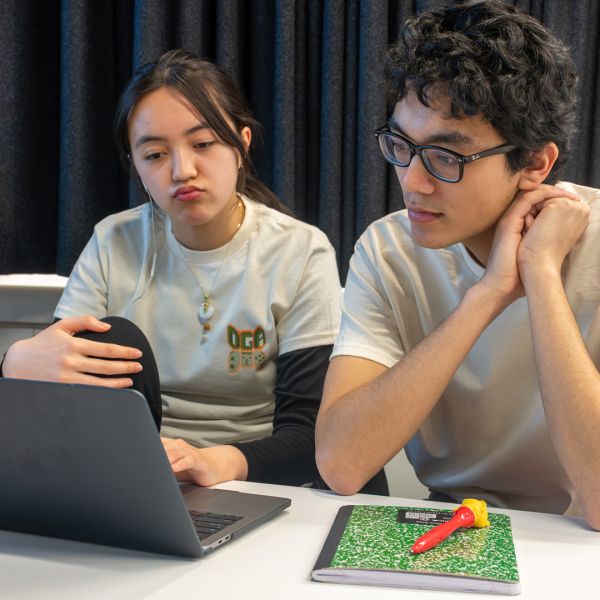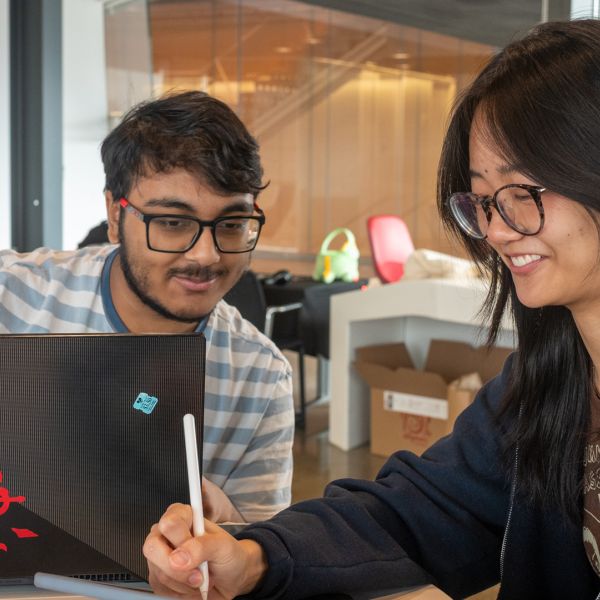March 10, 2025
By Dina Shlufman
The Development in Games Association (DGA) at Cornell hosted its first in-person game jam on March 1 and 2 in Gates Hall.
Twelve teams tackled the challenge to create a video game in just two days with the theme, "Third Time’s the Charm."
“I hope this event kindles some people’s passion for game design,” said Jacob Seto ’26, DGA president. “No matter what sort of skill sets or experience that you’re coming from, anyone can make a game.”
DGA, founded in 2001 under the name Digital Gaming Alliance, is a “community of undergraduate Cornell students interested in game design and game development,” Seto said.
From workshops to networking to developing a yearly game to be posted on Steam and Itch.io, the club provides students of all skill levels who have an interest in creating video games the tools they need to build their own.
DGA typically attends PAX East, a gaming convention held annually in Boston. However, this year, the club wanted to create their own event right here in Ithaca.
Gabrielle Loncke ’26, vice president of DGA, wanted students across disciplines to participate in the game jam.
“Usually hackathons are more promoted towards STEM, computer scientists, engineers, but for a game jam we’re trying to promote to not just computer scientists but to artists, to music designers, producers, to writers,” Loncke said. “When you’re building a game, you’re not just seeing code, you have to see art and hear sound.”
 Seto thinks game jams like this one are beneficial to creators, who can channel their skills into a single project.
Seto thinks game jams like this one are beneficial to creators, who can channel their skills into a single project.
“Game jams give you the ability to have something smaller in scope and be able to execute an idea on a much smaller timeline,” Seto said. “It can also be creatively rewarding, as you can put all of your focus into a much smaller concept.”
From 12 p.m. on Saturday to 5 p.m. on Sunday, the teams worked together to create their games in Gates Hall 310. Throughout the weekend, there were many mini workshops to help creators refine their skills.
Gregor Guerrier ’26, a member of the team Studio BG, helped develop the game Charmed to Death, where a girl is tasked with solving a murder mystery.
“I like making games,” Guerrier said. He hoped the event would help him improve his skills and form connections with other students.
Sophia Li ’28 and Abrar Amin ’28 together formed the team Studio A&S. Both computer science majors, they enjoy creating games because it helps them explore their creative side.
“It’s very cool trying to apply a creative aspect to a game. I feel like when you learn CS, some of it’s kind of lost,” Amin said. “With game development, you can add your own little flavor to everything.”
Li and Amin created the game The Last Pull, which is a turn-based combat game involving a slot machine.
Walker White, M.S. ’98, Ph.D. ’00, DGA advisor and head of the Game Design Initiative at Cornell (GDIAC), hoped this event, where participants are constrained by both time and theme, would help students build their portfolios.
“In a creative field like game design, these constraints actually make you better,” said White, who is a senior lecturer and Stephen H. Weiss Provost’s Teaching Fellow in the Cornell Ann S. Bowers College of Computing and Information Science.
At 5 p.m. on Sunday, DGA held a closing ceremony in Gates G01, where each team presented their game to three judges, Seto, White, and Benjamin Kalb ’07, a Cornell alumnus and founding member of DGA who works at Blanket Fort Games, a gaming studio based in Ithaca. Three teams received awards.
Chase Mayers, a teaching support specialist in the College of Agriculture and Life Sciences of team Mycoscopic Studios, won the DGA's Choice Award for his game, Trips, about delivering mail in a fragmented void. Nolan Fuller ’25 received the award for Best Theme Interpretation for his 2D strategy defense game, Gatekeeper. Paul Houle, Ph.D. ’98, Danielle Imogu ’27, and Aghamatlab Akberzade ’25 of the team 3 Musketeers Studio won the Player Choice Award for their game, Trinity Blocks, in which a squishy green block named Jelly must advance through the world.
Prizes for the winners included a gaming chair, "blind boxes" of prizes, and a free trip to display their creations with DGA at the Maker Faire in Syracuse.
For students who want to participate in a future game jam, White encourages them to build a “varied team” composed of programmers, artists, and musicians, as all of these individuals are able to use their unique skills to create a project.
“Learning how to work on a team where not everybody has the same skill set is a really important job skill,” White said.
Dina Shlufman ’27 is a student writer for the Cornell Ann S. Bowers College of Computing and Information Science.



